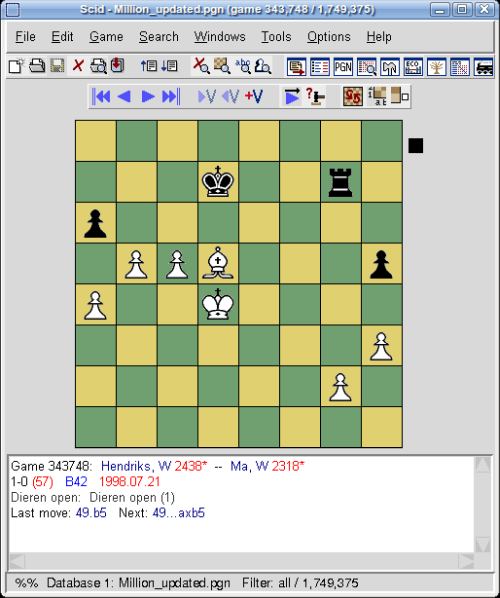Shane’s Chess Information Database (SCID) is a chess database application with a graphical user interface. It can also be used for playing on internet chess servers, or playing against a chess program.
With Scid you can maintain a database of chess games, search games by many criteria, view graphical trends, and produce printable reports on players and openings. Scidlet or any other WinBoard-compatible chess engine, and even use Scid to study endings with endgame tablebases.
There are three main programs that make up Scid:
- scid is the main application, with a graphical user interface.
- scidlet is a chess engine which can be used in Scid to analyze chess positions.
- pgnscid is a command-line (console) program that converts PGN files into scid format.
Scid supports portable game notation and its own compact and fast Scid database format. It can be used with chess engines such as Crafty and GNU chess, and with UCI such as Toga II, Fruit, Rybka and Shredder to play chess against or to analyse games. Scid can use up to five piece endgame tablebases. Photographs of players may be stored in the database, so they are shown when a game is played.
Features include:
- Scid analysis window provides a way to have a chess engine such as Crafty analyse the current position, automatically restarting the analysis whenever the position changes.
- Search games by exact position, material, player names, and many other criteria.
- Export games in PGN, HTML, or LaTeX formats.
- Save opening reports in HTML, LaTeX, or plain text format.
- Built-in chess program called Scidlet.
- UCI and xboard engines are supported.
- Play by correspondence.
- View graphical trends.
- Piece tracker.
- Tournament finder.
- ECO browser.
- Repertoire editor.
- Crosstable.
- Study Variations.
- Docked windows.
- Produce printable reports on players and openings.
- Multi-language support.
Website: scid.sourceforge.net
Support: Documentation
Developer: Shane Hudson
License: GNU General Public License

SCID is written in C++. Learn C++ with our recommended free books and free tutorials.
| Popular series | |
|---|---|
| The largest compilation of the best free and open source software in the universe. Each article is supplied with a legendary ratings chart helping you to make informed decisions. | |
| Hundreds of in-depth reviews offering our unbiased and expert opinion on software. We offer helpful and impartial information. | |
| The Big List of Active Linux Distros is a large compilation of actively developed Linux distributions. | |
| Replace proprietary software with open source alternatives: Google, Microsoft, Apple, Adobe, IBM, Autodesk, Oracle, Atlassian, Corel, Cisco, Intuit, and SAS. | |
| Awesome Free Linux Games Tools showcases a series of tools that making gaming on Linux a more pleasurable experience. This is a new series. | |
| Machine Learning explores practical applications of machine learning and deep learning from a Linux perspective. We've written reviews of more than 40 self-hosted apps. All are free and open source. | |
| New to Linux? Read our Linux for Starters series. We start right at the basics and teach you everything you need to know to get started with Linux. | |
| Alternatives to popular CLI tools showcases essential tools that are modern replacements for core Linux utilities. | |
| Essential Linux system tools focuses on small, indispensable utilities, useful for system administrators as well as regular users. | |
| Linux utilities to maximise your productivity. Small, indispensable tools, useful for anyone running a Linux machine. | |
| Surveys popular streaming services from a Linux perspective: Amazon Music Unlimited, Myuzi, Spotify, Deezer, Tidal. | |
| Saving Money with Linux looks at how you can reduce your energy bills running Linux. | |
| Home computers became commonplace in the 1980s. Emulate home computers including the Commodore 64, Amiga, Atari ST, ZX81, Amstrad CPC, and ZX Spectrum. | |
| Now and Then examines how promising open source software fared over the years. It can be a bumpy ride. | |
| Linux at Home looks at a range of home activities where Linux can play its part, making the most of our time at home, keeping active and engaged. | |
| Linux Candy reveals the lighter side of Linux. Have some fun and escape from the daily drudgery. | |
| Getting Started with Docker helps you master Docker, a set of platform as a service products that delivers software in packages called containers. | |
| Best Free Android Apps. We showcase free Android apps that are definitely worth downloading. There's a strict eligibility criteria for inclusion in this series. | |
| These best free books accelerate your learning of every programming language. Learn a new language today! | |
| These free tutorials offer the perfect tonic to our free programming books series. | |
| Linux Around The World showcases usergroups that are relevant to Linux enthusiasts. Great ways to meet up with fellow enthusiasts. | |
| Stars and Stripes is an occasional series looking at the impact of Linux in the USA. | |
